One Boeing whistleblower attends the memorial for another. The ‘air capital’ is on edge
The aviation industry has been at the epicenter of Wichita, Kansas – the self-styled “Air Capital of the World” – for more than a century. But as layoffs are announced and one Boeing supplier whistleblower attends a church service in memory of another, the second whistleblower to die in recent months, uncertainty reigns. Sheila Flynn reports from Wichita
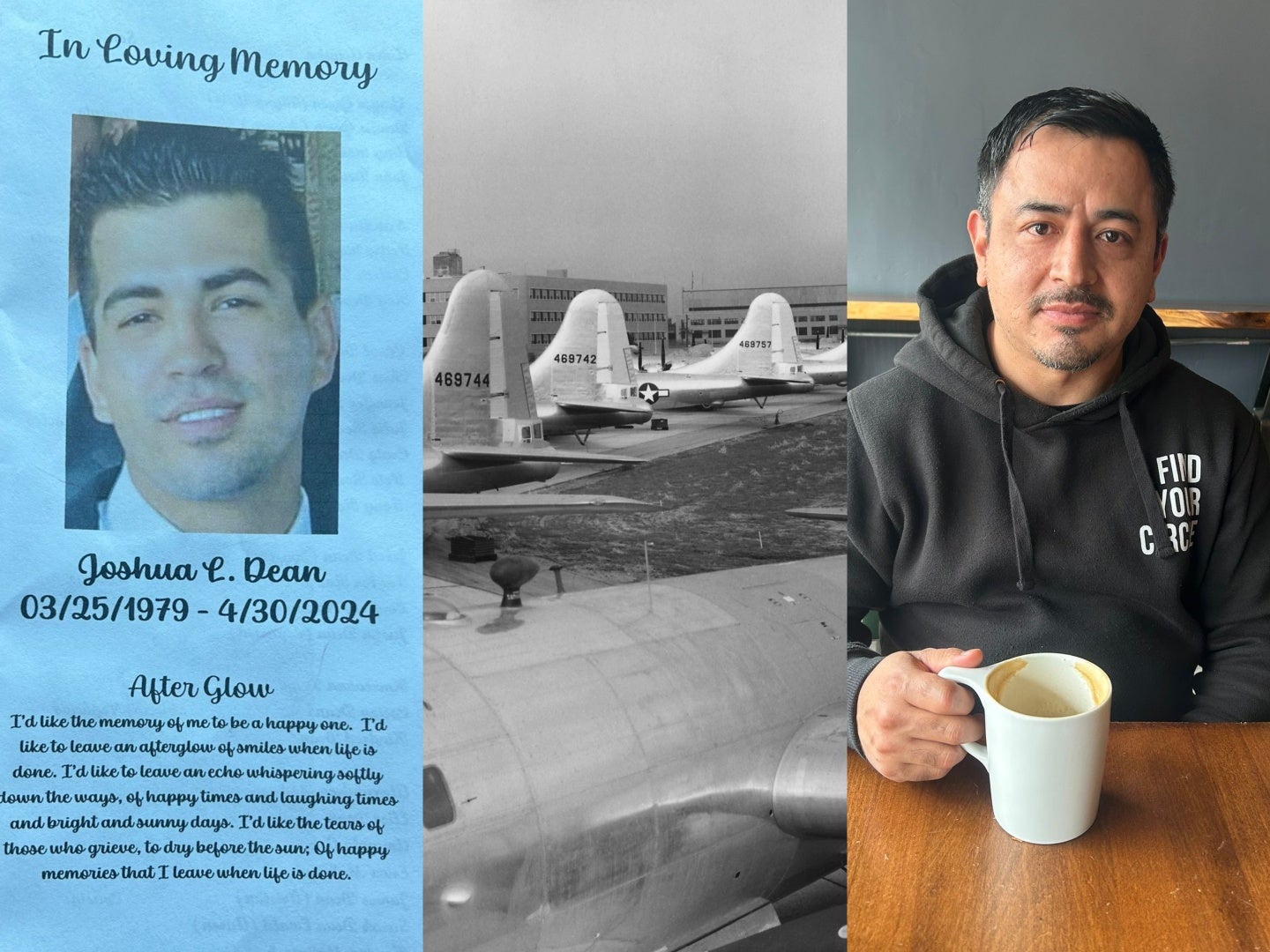
The smiling face of whistleblower Joshua Dean stared out from a flower-laden portrait on Thursday at a Wichita Baptist church as loved ones remembered the 45-year-old – known for faith, fierce intelligence and an incessant curiosity bordering on “annoying,” one celebrant preacher joked to the packed congregation.
Mr Dean, an avid athlete, died on 30 April after a desperate battle with a sudden illness that saw him airlifted from Kansas to Oklahoma, where he ultimately passed away. Academically gifted and the holder of multiple advanced degrees, he’d given depositions in a shareholder lawsuit against Boeing supplier Spirit AeroSystems, where he’d previously been employed as an auditor – following the path of his stepfather, who worked at the key Wichita site for decades.
“It’s no secret, if you’re here in the building, you probably know he was one of the whistleblowers at Boeing,” Rev. Jerrod Vickers said Thursday. “And I really believe that that was the intent of his heart: He just wanted to see that people were safe and was willing to do what it takes to ensure that. He put himself at great risk to do so … because he loved people.”

Dean is survived by a son, parents, siblings and extended family; several hundred people on Thursday joined them for a celebration of his life at Cross Point Free Will Baptist Church.
“You know, 45, that is a very short time on Earth,” the preacher continued, “and yet it’s a very long time.”
The gathering took place less than five miles from the sprawling headquarters of Dean’s former employer Spirit Aerosystems, which spans 600 acres and employs about 12,000 – more than half the company’s global workforce.
It’s one of about 450 aerospace companies dominating the economy of Wichita – which has been proudly proclaiming itself the ‘Air Capital of the World’ from the Kansas plains for nearly a century. Trucks and trains loaded with fuselage parts are a common sight, and workers everywhere wear badges with the names of aviation stalwarts – Spirit, Bombardier, Textron (formerly Cessna) and Airbus.
Among the mourners on Thursday was a former Spirit coworker, Santiago Paredes – who himself became a whistleblower at the aviation manufacturer, which counts Boeing as its biggest customer, after encouragement from Dean. Paredes went public with his claims about quality control issues in the days after the passing of his friend, which already came on the heels of the March death of another whistleblower, John Barnett, a former Boeing quality manager.
A coroner’s report found last week that Barnett had died by suicide – but the timing and circumstances of his death raised eyebrows at the time, and the subsequent death of Dean, a little more than seven weeks later, poured gasoline on conspiracy theory rumors and lit a match on top of them.

Paredes brushed off rumors of whether nefarious forces were at play.
“I don’t think so,” he told The Independent over coffee before his friend’s memorial. “But, you know, I’m always looking behind my mirror to make sure nobody’s car’s following me. I’m not saying that I’m scared, but at the same time, I can’t put a blind eye to the reality of what could be. I have to prepare myself for that.”
The men had become friends at work when Paredes, a team leader, walked Dean, an auditor, through processes and answered questions.
“Then I ran into him in town a couple of times,” Paredes said. “We kind of built a little relationship, through eating in the cafeteria — that’s how he found out a lot of the stuff that I went through, because he was in the area when I was demoted, sent to the backdrop.”
Paredes had raised safety protocol issues during his time at Spirit, claiming he was demoted for sharing his concerns – though he was reinstated shortly before leaving the company in 2022. He’d moved on and had put Spirit in the past when Dean – part of a shareholder lawsuit – contacted him last year, Paredes told The Independent.
“He’s like, ‘Hey, I know what happened to you – and I was wondering if you have any documents like the ethics reports and the emails’ that I had sent to the CEO and all that stuff,” said Paredes, who’d indeed kept copies of his warnings “just to cover my own butt.”
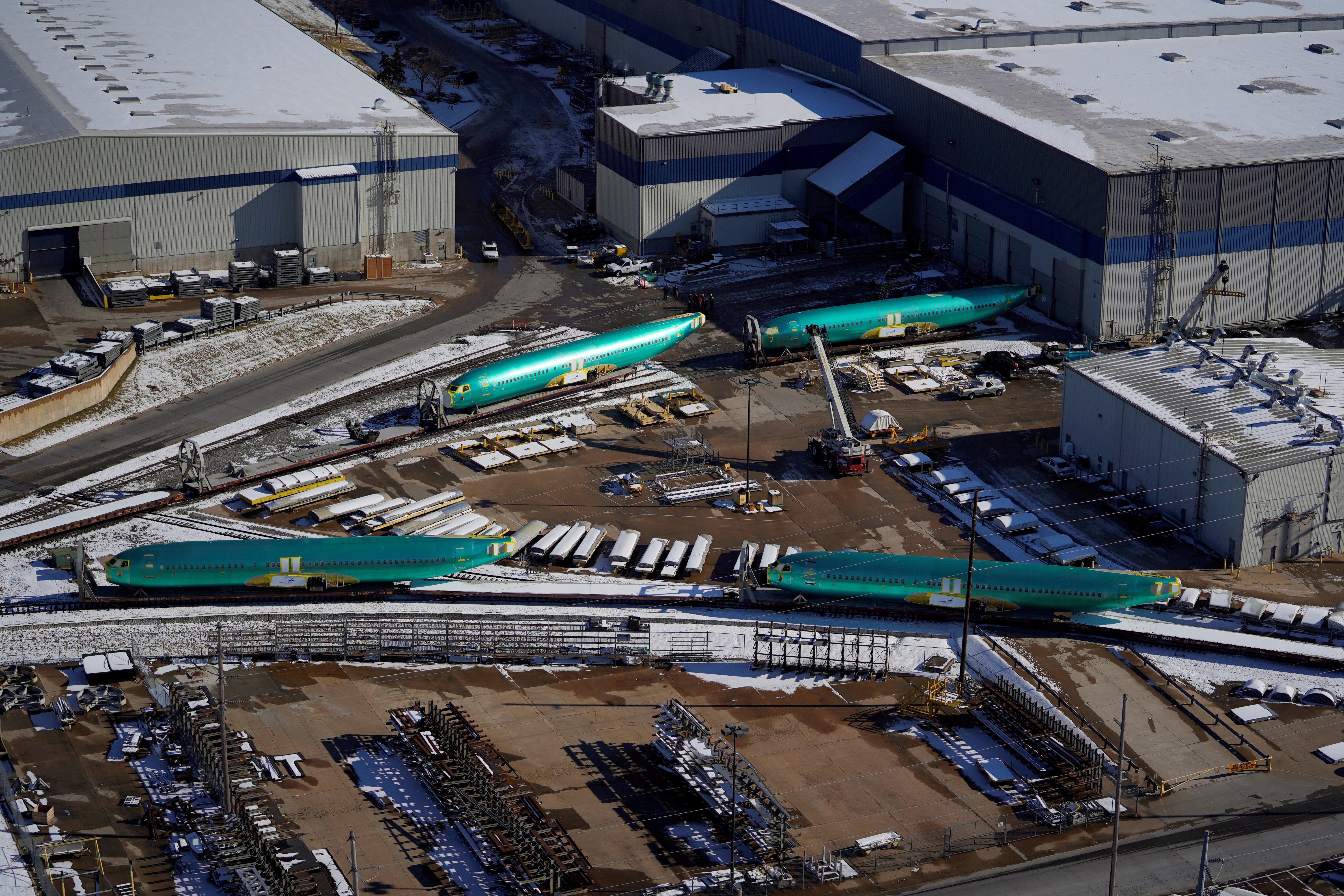
Paredes agreed to share what he’d seen and documented if he was assured anonymity. As an example of his friend’s upstanding character, he detailed how Dean avoided all contact with Paredes during his initial participation to avoid any appearance of collusion or impropriety.
That discipline and faith in the process, Paredes said, “speaks to his character, his integrity, and the kind of person that he was. He was a person with integrity, a person that wanted to do the right thing above anything else.”
Paredes drove the three hours on Thursday morning from his new home in Lawrence to Wichita, where the tentacles of Spirit, Boeing and the aviation industry touch every aspect of life. Main thoroughfares have names like Hydraulic Avenue and Air Capital Boulevard, and local hotels give aviation industry discounts.
The Spirit campus is massive, a complex of hangars, offices, parking lots and yards with visible fuselage parts. It is buttressed by the Kansas Aviation Museum and McConnell Air Force Base.
At Harry’s Uptown Bar & Grill last week, every person sitting at the bar either worked in the aviation industry or had friends and family employed by it. Ron Lentz, a trucker who grew up in Wichita, pointed out that not only his ex-wife but his son’s ex-wife and ex-girlfriend worked at the same department at Spirit. Across the horseshoe bar – where deceased patrons are immortalized with name plaques – sat the CEO of an oil company exporting jet fuel.
“You can’t talk to anybody that don’t know somebody or is not connected somehow,” Lentz told The Independent. He was sweeping the floor of an aviation machine shop back in junior high; now his retired high school friends are returning to work part-time at aviation jobs, some after already finishing careers there.
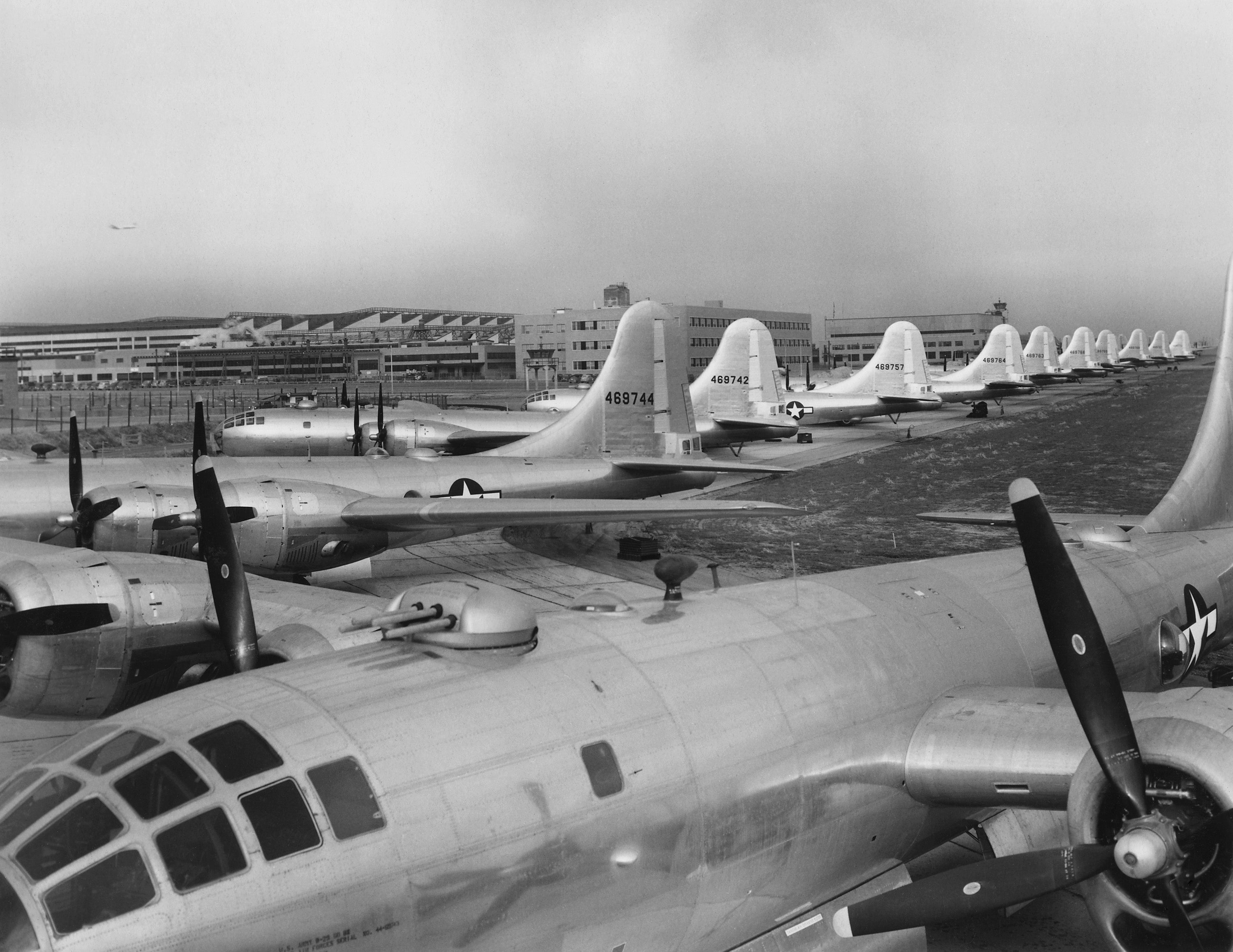
Clyde Cessna, a rural Kansan, completed his first successful flight with a self-built plane in 1911 and five years later moved his airplane manufacturing operation from his farm to Wichita. Other aircraft manufacturers followed, and a merger at the tail-end of the 1920s first brought the name Boeing to the region, according to the Kansas Aviation Museum (which now includes the Boeing: Science, Math, and HIstory Center & Lattner Learning Hangar.)
The city was already well established as an aircraft production hub before World War II, which created a boom, employing tens of thousands; despite post-war layoffs – introducing Wichita to the tenuous bust-or-boom nature of aviation employment – the industry continued growing in the region..
Boeing, in particular, became known as a great place to work. Wichitans still wax lyrical about the company pool from the 1960s, the enviable benefits and the pride workers took in their employer.
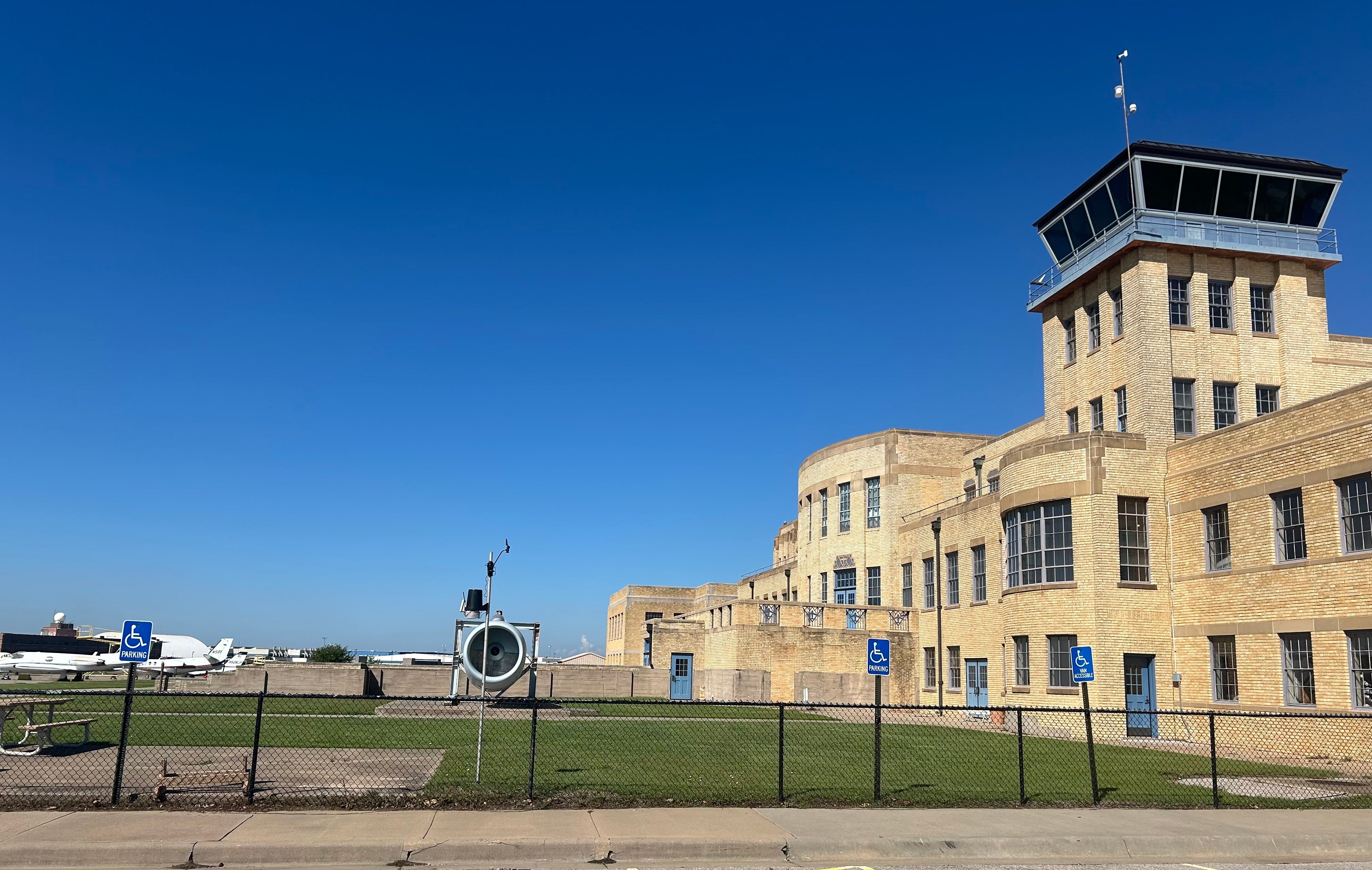
“Boeing was, for a long time, for the most part, a revered and beloved company,” says aviation freelancer and local historian Richard Harris, whose grandparents worked for the aircraft giant. “But towards the end of their time here, relations got testy. Boeing had some tough negotiations with the machinist union, the International Association of Machinists – and the addition of a new union representing the white collar workers at Boeing put more pressure on Boeing.”
In the end, Boeing pulled out of Wichita in 2012, leaving more than 2,000 job losses – though it had already spun off its commercial division to Spirit, which remained a main supplier.
“There is a deep, I think, sour feeling towards Boeing ever since they pulled out,” says Harris, who says the move was locally viewed as the company “getting even with the union for a strike” and “generally regarded here as an act of outright spite by Boeing.”
We don’t trust the aircraft industry like we used to.
The departure of such a tried-and-true long-time employer was indicative of a larger trend and deeply hurt Wichita, he says.
“We don’t trust the aircraft industry like we used to,” Harris tells The Independent. “There are so many people who feel that you could be fired just for looking cross-eyed at the wrong person – and there’s a real distrust of management farther up the chain. There’s a tremendous distrust of management that’s remote.”
About 24 hours after Harris made those observations, as mourners were gathering for Dean’s memorial, word was trickling through the ranks of Spirit workers that hundreds of them would soon be facing layoffs.
At the local Kwik Shop, the closest convenience store to Spirit, one customer who said he worked on Spirit fuselages looked shell-shocked when he told The Independent he’d received a phone alert minutes beforehand about the upcoming losses.
It was something Wichita had been dreading in the wake of all of the negative and sensational headlines. Boeing has been engaged with talks to again merge with Spirit, and with mergers often come cuts; on Thursday news broke of an internal memo outlining the upcoming dismissal of around 400 hourly workers.
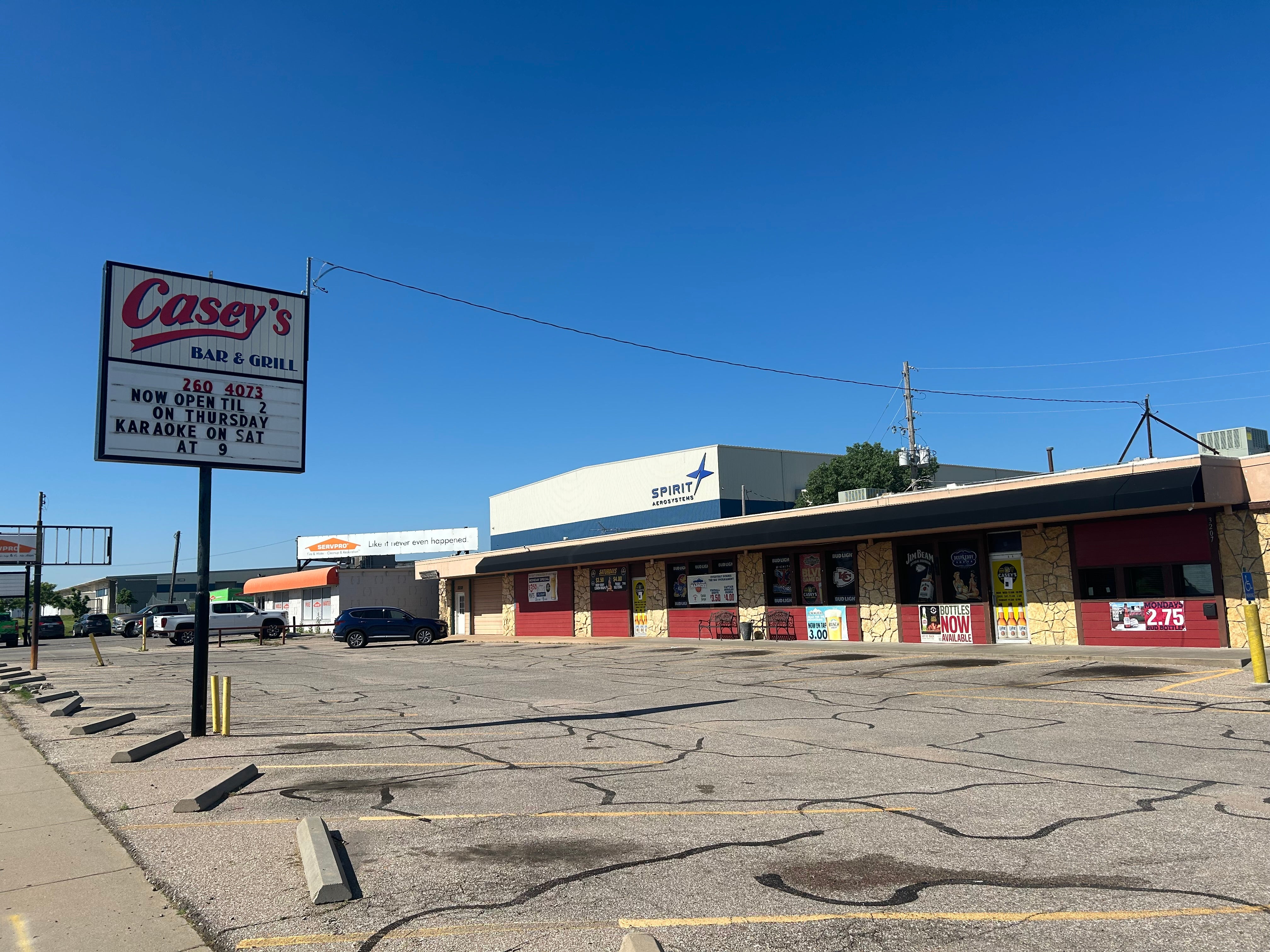
Hours later at Casey’s Bar & Grill – a dark, low-ceilinged favorite hangout of Spirit workers at the edge of the company’s site – it was uncharacteristically quiet after the first shift clocked off on Thursday afternoon. One couple, a teacher and a Spirit worker, discussed the job losses as they prepared to go to their daughter’s school event; they believed his job was safe for now.
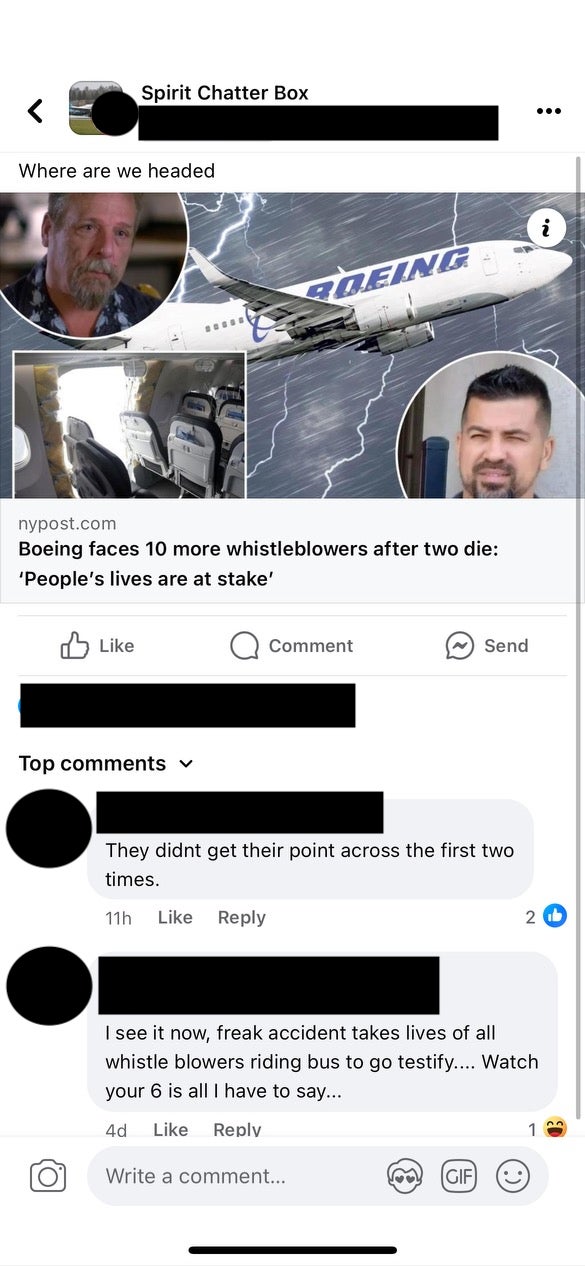
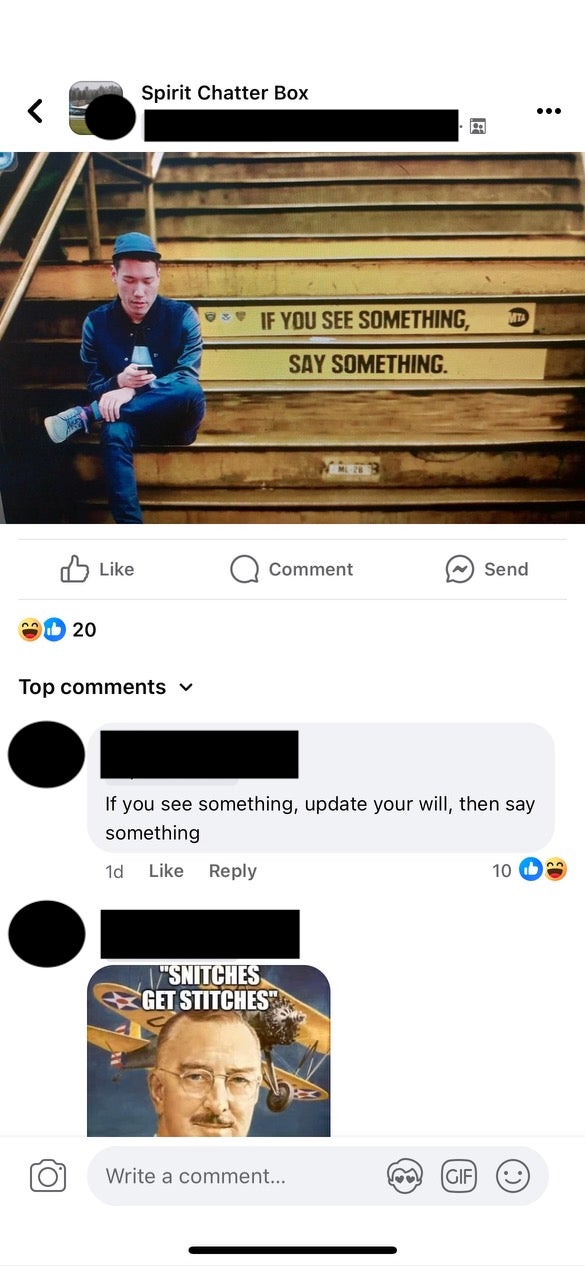
The newly-revealed job losses were taking conversational precedent over gossip about whistleblowers, which has provided limitless fodder on employee forums for weeks – spurred, again, by the deaths of two of them. Locals have been sharing gallows humor memes and jokes, though everything is tinged with genuine concern.
“If you see something, update your will, then say something,” one employee wrote in a private Facebook forum for Spirit employees.
“I see it now, freak accident takes lives of all whistle blowers riding bus to go testify,” wrote another Wichita-based Spirit manager in the employee forum. “Watch your 6 is all I have to say…”
I feel like whenever we brought stuff up in Wichita they would sweep it under the rug.
Paredes, for his part, told The Independent he had steeled himself for backlash from other workers but has been bolstered by a steady stream of support. He’s been receiving messages from former and current employees not only applauding his bravery but also backing up his claims – worryingly.
“I feel like whenever we brought stuff up in Wichita they would sweep it under the rug,” one former Spirit employee, who took a job with another company out of state at the end of last year, said in one message seen by The Independent. “Until you either stop caring or you leave.”
“When this came up I found my defenses were up,” wrote another former coworker, offering to buy Paredes a beer. “In my eyes you’ve always been honorable and one of the people on the inspection team I respected the most. I applaud your transparency and willingness. You’ve earned even more of my respect.”
Paredes says he’s hoping for an aviation culture change which will percolate from the top down. But in the meantime, in the face of job losses, dying whistleblowers and unquestionable uncertainty, the vibe across Wichita remains uneasy.
“I have never seen or felt the city more uptight about its role in aviation as it is right this moment,” local historian Harris tells The Independent.
Join our commenting forum
Join thought-provoking conversations, follow other Independent readers and see their replies
Comments
Bookmark popover
Removed from bookmarks